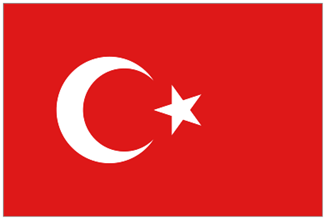Turkey
2 Chapter Basic knowledge
-
-
1 Chapter Coming Soon
2 Chapter Basic knowledge
3 Chapter Investment Environment
3.4 Advances of Japanese Companies
4 Chapter Incorporation
4.1 Feature of business location
4.2 Establishment of Business location
4.3 Liquidation and evacuation (dissolution) of company.
5 Chapter M&A
5.1 Trends of mergers and acquisitions in Turkey
5.2 Laws and Regulation related mergers and acquisitions
5.3 Tax law related mergers and acquisitions
5.4 Base of scheme of mergers and acquisitions
5.5 Problem after corporate acquisition
5.6 Process of mergers and acquisitions
6 Chapter Corporate Law
7 Chapter Accounting
8 Chapter Tax Laws
8.1 Important points about tax law to advance into Turkey
8.2 Regulation of international tax and accounting in Turkey
8.3 Regulation of domestic tax law
9 Chapter Labor
-
-
-
Basic Information
■Official Country NameRepublic of Turkey■National Flag ■National Land / Area/Capital783.562 km²
■National Land / Area/Capital783.562 km²
■ClimateTemperate; hot, dry summers with mild, wet winters; harsher in interior.
■Time Difference.•Tokyo is +7:0 hours from Turkey•Beijing is +6 hours from Turkey•Paris and Berlin are -1 hour from Turkey•Mexico City is -8:0 Hours from Turkey
■Population.79,248,136 persons in 2016.Turkey population is equivalent to 1.07% of the total world population.
■LanguageThe official language, Turkish, is the first language spoken by 90% of the 63m population. Minority languages include Kurdish, spoken by 6% of the population. Arabic is spoken by 1.2% of the Turkish population; most of those speakers are bilingual Arabic and Turkish speakers. Other minority languages include Circassian, spoken by more than 0.09% throughout the country, Greek, Armenian and Judezmo, a Romance language spoken by Jews.
■CurrencyTurkish Lira
■ReligionMuslim 99.8% (mostly Sunni), other 0.2% (mostly Christians and Jews) -
Political System and History
■Political SystemTurkey is a parliamentary democratic republic.■AdministrationThe Prime Minister of Turkey is the head of government, and the President of Turkey is the head of state who holds a largely ceremonial role with substantial reserve powers. Turkey's political system is based on a society of powers. Executive power is exercised by the Council of Ministers. Legislative power is vested in the Grand National Assembly of Turkey. The judiciary is independent of the executive and the legislature.■CongressLegislative power is invested in the 550-seat Grand National Assembly of Turkey (Türkiye Büyük Millet Meclisi), representing 81 provinces. The members are elected for a four-year term by mitigated proportional representation with an election threshold of 10%. To be represented in Parliament, a party must win at least 10% of the national vote in a national parliamentary election. Independent candidates may run, and to be elected, they must only win 10% of the vote in the province from which they are running.[Turkish Main History]■Ottoman EmpireStarting from the late 13th century, the Ottomans united Anatolia and created an empire encompassing much of Southeastern Europe, Western Asia and North Africa, becoming a major power in Eurasia and Africa during the early modern period. The empire reached the peak of its power between the 15th and 17th centuries, especially during the 1520–66 reign of Suleiman the Magnificent.■Independence, Establishment of the RepublicThe Turkish War of Independence (1919–22), initiated by Mustafa Kemal Atatürk and his colleagues in Anatolia, resulted in the establishment of the modern Republic of Turkey in 1923, with Atatürk as its first president. Ankara as Turkish consolidated capital and abolished the sultanate. The modernization effort to Atatürk was unbreakable, so transformed the Turkish state at all levels. Everything was scrutinized, from the use of language turbans, and the necessary reforms are made. During the 1920s and 1930s, Turkey adopted the Gregorian calendar and the Roman alphabet, standardized language, banned the use of the fez, instituted universal suffrage and decreed that the Turks should have names, some not what they had always been, approaching and more to the West.■Modern TurkeyIn 1952 Turkey abandons Ataturk's neutralist policy and joins Nato, in 1960 there’s an Army coup against ruling Democratic Party. [The political and economic chaos continues for the rest of the 1970s, so that in 1980, the military took over the power to restore order. They did so through the new and feared National Security Council, but in 1983 they allowed elections. For the first time in decades, a satisfactory result for the country was recorded. Turgut Ozal, leader dela Mother Motherland Party (ANAP), won a majority and not having to deal with government partners, put back on track the country. Özal, shrewd economist pro-Islamic, reflects some important economic and legislative reforms that allowed Turkey to reach a good international level and plant the seed for future development. Turgut Ozal died suddenly in 1993, leaving a power vacuum. Throughout the decade, weak coalition governments followed, with characters who suddenly disappeared from the political scene. Tansu Çiller was briefly the first woman to head the Turkish government, but it’s so airy feminine touch and economic experience nor found the solution to the Kurdish question nor the delicate financial situation improved. In December 1995, the religious Welfare Party (RP) able to form government with veteran Necmettin Erbakan at the top. Drunk with power, politicians made some Islamist RP statements provoked the ire of the army. In 1997, the National Security Council stated that the RP had committed contempt contrala Constitution, prohibiting the use of religion in politics. Faced with what some called a "coup d'postmodern state," the government resigned and dissolved RP.]
-
-
-
References
http://www.kwintessential.co.uk/resources/global-etiquette/turkey-country-profile.htmlhttps://en.wikipedia.orghttp://www.lonelyplanet.es/destino-asia-turquia-99-historia.html
-



 Japan
Japan UnitedStates
UnitedStates China
China Hong Kong
Hong Kong Mongolia
Mongolia Russia
Russia Thailand
Thailand Vietnam
Vietnam Laos
Laos Cambodia
Cambodia Myanmar
Myanmar Indonesia
Indonesia Philippines
Philippines Singapore
Singapore Malaysia
Malaysia India
India Bangladesh
Bangladesh Pakistan
Pakistan Sri Lanka
Sri Lanka Mexico
Mexico Brazil
Brazil Peru
Peru Colombia
Colombia Chile
Chile Argentina
Argentina DubaiAbuDhabi
DubaiAbuDhabi Turkey
Turkey South Africa
South Africa Nigeria
Nigeria Egypt
Egypt Morocco
Morocco Kenya
Kenya